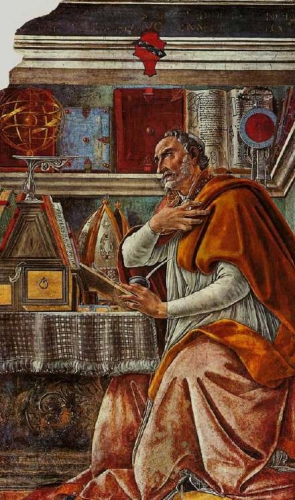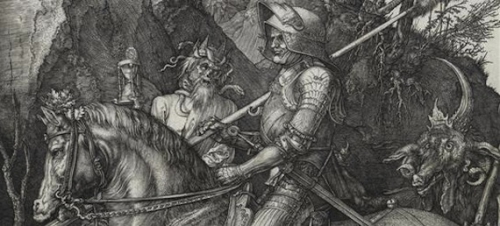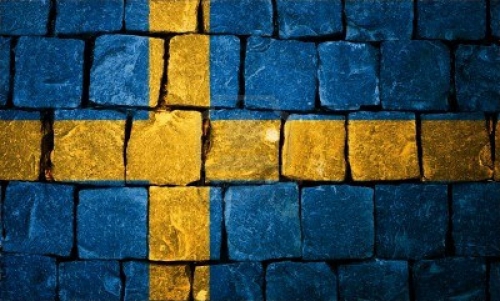di Giandomenico Casalino
Ex: http://www.ereticamente.net
Perché, nel mondo indoeuropeo, non vi è la presenza della “personalità” nel senso di Io come Soggetto, ma vi è solo il Sé che è il Principio Ordinatore del Mondo che è nel Mondo ed è l’Intelletto attivo-divino di Aristotele? Per la ragione che, se la “parte” superiore dell’uomo, quella divina, non è “personale”, nel senso che non è del soggetto né si identifica con esso, è vero invece che la “persona”, il Soggetto, l’Io, uccidendosi come tale, deve salire (Ascesi) verso il Nous, lo Spirito ed identificarsi con esso, con la “parte” superiore; deve ricordare, prendere coscienza e quindi Sapere che egli nella sua vera realtà è il Pensiero Cosmico, l’Oggettivo, l’Eterno, e che non è mai stato “io” (coscienza, intelletto – nel senso hegeliano – sentimenti, passioni…); che tale fantasma (io storico-sociale, soggetto alla coscienza di veglia) non solo scompare e si dilegua ogni volta che l’uomo si avvicina al processo di dissociazione, che è la morte, in un itinerario che è poi alquanto simile a quello del sonno (Eraclito); ma è “qualcosa” di tanto labile, transeunte e fallace che, in sostanza, non è alcunché di stabile, di epistemico. Allora “anche” lo stesso Principio cosmico, il Divino, to Thèion, è impersonale, nel senso che supera, va oltre il concetto di “persona”, di soggetto, di Io, e, quindi, per causalità filosofica, la sapienza indoeuropea è oltre la “dialettica” teismo-ateismo, in quanto, poiché il Divino non ha alcuna natura “personale”, non può sussistere il Dio-persona, al quale si attribuiscono conseguenzialmente le potenze dell’animo della persona: volontà, amore, gelosia…; al quale si può contrapporre solo la negazione di esso con l’atteggiamento spirituale dell’ateismo.
Da ciò discende che in tale visione del Mondo, il “problema” della “immortalità” dell’anima, nel mondo indoeuropeo, non sussiste come tale per la semplice ragione che il Principio Divino, intelletto attivo in termini aristotelici, pur presente nell’uomo in genere, in guisa però incosciente, è presente in senso attivo e cosciente solo in colui il quale si identifìca consapevolmente con esso, in colui il quale vive il bios theoretikòs e, anche per un Istante, esperimenta nella pura Contemplazione, ciò che gli Dei sono sempre! Pertanto non vi può essere, nel mondo indoeuropeo, concezione di una “immortalità”, che poi scade e si rivela pura e semplice “speranza” di sopravvivenza personale dell’anima, poiché il soggetto come individuo non è assolutamente pensato e ciò che è nobile ed eterno in esso in tanto lo è in quanto nulla ha a che fare con l’individualità soggettiva ma bensì con l’Oggettività dello Spirito, essendo questo, peraltro, il “riflesso” del Principio Divino cosmico che è impersonale. Nel mondo arcaico omerico e romano vale, pertanto, il discorso relativo alla virtus eroica: è la Gloria dell’Eroe, in quanto il migliore (àristos) tra gli uomini, che viene cantata dalle Muse attraverso il Cantore, tale è l’immortalità genuinamente indoeuropea: quella dell’eroe; solo Eracle giunge alla divinificazione ed all’accoglimento nell’Olimpo. E qui si deve riflettere sullo “strano” destino del semantema della parola greca dòxa: nel mondo omerico essa ha il significato dell’apparire della Luce, della Gloria, è l’onore che avvolge e distingue l’Eroe quando si presenta agli occhi della comunità dei guerrieri ed è quindi l’apparenza di ciò che appare, nel senso che ciò che l’Eroe è nell’ “interno” (di cui come tale l’Eroe comunque non ha coscienza…), nell’animo, è identico a ciò che è nell’ “esterno”, nella forma in cui appare come esistenza della sua essenza, poiché, come abbiamo già detto, è uomo trasparente ed aperto al Mondo.
La stessa parola, dopo l’avvento della decadenza della spiritualità greca che conduce all’oscurarsi della trasparenza in un’opacità spessa ed impenetrabile, l’apparenza, la dòxa, non è più la Luce “interna”-”esterna”, ma la coltre di nebbia della non-conoscenza, è ciò che nasconde e cela “qualcosa” che forse c’è ma che potrebbe anche non esserci e, pertanto, è opinione e quindi fallibile. Essa ormai come apparenza che inganna, che nasconde, può essere cacciata via solo dal suo “contrario”: dalla Verità che in greco si chiama proprio Alètheia e cioè quella “forza” che elimina, annulla (a privativo) il Lanthàno che è il nascondimento e che è come dire il “nuovo” significato di dòxa. Infatti in Platone tale processo è già completo, e la dòxa-opinione non è conoscenza proprio perché è frutto dell’inganno dell’apparenza che è la serie di ombre (vedi il mito della Caverna…) che oscurano e ingannano la vista; l’apparire non è più l’Essere, l’esistenza non coincide più con l’essenza (ed è straordinario che tale recuperata identità sia invece proprio l’oggetto di cui tratta Hegel nella Scienza della Logica - Logica oggettiva – che è il Sapere dell’Assoluto…) e quindi la falsità dell’apparenza, il suo inganno, devono essere superate mediante l’Ascesi sapienziale per giungere all’ “interno”, poiché esso, lo Spirito, non è più visibile, “esterno” nel mondo, non è più apparente, nel senso che non appare più come forma intelligibile, se non agli occhi dello Spirito di colui che è iniziato al logos filosofico; e siamo già nella lotta per lo Spirito che ingaggiò Platone e nella differenza (tragica…), da lui tematizzata, tra dòxa (opinione) ed epistème (Sapere incontrovertibile poiché anipotetico).
*****
 È in Agostino e nei suoi dialoghi interiori con il suo Dio che nasce l’Io moderno come soggetto-singolo; Agostino dice per la prima volta: “Ego”, anticipando Cartesio e tutto il soggettivismo moderno. Pertanto effettuale all’assenza di qualsiasi personalismo o soggettivismo, in quanto non vi è, nel mondo indoeuropeo, alcuna presenza dell’Io, come si è accennato sopra, è l’inesistenza culturale della tematica “teismo-ateismo” che è processo dialettico paralizzante interno alla cultura astratta del monoteismo creazionistico e potenzialmente ateo, in quanto concepisce Dio come persona (personalizzazione del Divino) dotata di volontà e “progetto” creativo, d’ “amore” e di “compassione”, il tutto in una “umanizzazione” del Divino a cui, giustamente, W.F.Otto contrapponeva la elevazione greca ed indoeuropea dell’uomo verso il Divino e cioè la “divinizzazione” dell’umano (omòiosis theò). Nel mondo spirituale indoeuropeo in tanto non vi è dualismo religioso, in tanto il Divino è nel Mondo, in quanto esso (il Divino) non è nulla di personale, di “umano”, e quindi di “staccato” dal mondo; esso è, invece, il Principio del Mondo, il suo Arché ed è presente “in esso” impersonalmente poiché Potenza Divina nel Mondo medesimo; essendo (il Divino) il Mondo stesso però nella sua essenza: come Idea dell’Unità; in caso contrario non avrebbe avuto senso la sapienza ellenica che insegna (da Talete a Proclo…) che il mondo è ricolmo di Dei! L’assenza del concetto teistico di persona fa cadere nel nulla dell’inesistenza l’altro polo ad esso connesso: l’ateismo, il quale sorge inesorabilmente quando quella “persona” viene meno perché scompare la fede (secolarizzazione… modernità).
È in Agostino e nei suoi dialoghi interiori con il suo Dio che nasce l’Io moderno come soggetto-singolo; Agostino dice per la prima volta: “Ego”, anticipando Cartesio e tutto il soggettivismo moderno. Pertanto effettuale all’assenza di qualsiasi personalismo o soggettivismo, in quanto non vi è, nel mondo indoeuropeo, alcuna presenza dell’Io, come si è accennato sopra, è l’inesistenza culturale della tematica “teismo-ateismo” che è processo dialettico paralizzante interno alla cultura astratta del monoteismo creazionistico e potenzialmente ateo, in quanto concepisce Dio come persona (personalizzazione del Divino) dotata di volontà e “progetto” creativo, d’ “amore” e di “compassione”, il tutto in una “umanizzazione” del Divino a cui, giustamente, W.F.Otto contrapponeva la elevazione greca ed indoeuropea dell’uomo verso il Divino e cioè la “divinizzazione” dell’umano (omòiosis theò). Nel mondo spirituale indoeuropeo in tanto non vi è dualismo religioso, in tanto il Divino è nel Mondo, in quanto esso (il Divino) non è nulla di personale, di “umano”, e quindi di “staccato” dal mondo; esso è, invece, il Principio del Mondo, il suo Arché ed è presente “in esso” impersonalmente poiché Potenza Divina nel Mondo medesimo; essendo (il Divino) il Mondo stesso però nella sua essenza: come Idea dell’Unità; in caso contrario non avrebbe avuto senso la sapienza ellenica che insegna (da Talete a Proclo…) che il mondo è ricolmo di Dei! L’assenza del concetto teistico di persona fa cadere nel nulla dell’inesistenza l’altro polo ad esso connesso: l’ateismo, il quale sorge inesorabilmente quando quella “persona” viene meno perché scompare la fede (secolarizzazione… modernità).
La spiritualità religiosa greco-romana è fuori, è estranea a tali tematiche, poiché non conoscendo il teismo non conosce nemmeno l’ateismo, se non come atto mentale (ýbris) di un folle che nega il Mondo, la phýsis e cioè l’evidente che è il Divino.
La consapevolezza fondata sul sapere che è assente qualsiasi realtà “individuale”, (1) “personale”, “mia” nella “componente” immateriale dell’umano è ulteriore segno che evidenzia la tradizionale ed oggettiva spiritualità del mondo indoeuropeo. Se il Principio, il Nous, l’intelletto attivo, l’anima razionale è principio divino e immortale, nell’uomo Esso non è dell’uomo ma è bensì tutt’altro che individuale o “mio” o “suo”; è infatti universale ed ecco la ragione per cui è l’unica “parte” immortale nella realtà che abbiamo convenuto di chiamare “immateriale”. Quest’ultima è anche la “parte” che appare personale, individuale, che inerisce “quel” carattere, “quella” persona ed è il “suo” genio che, in termini biologici, è il corredo genetico; anche questo è, sulla superficie, l’Io storico-sociale, qualcosa che appartiene a quella persona e non ad altri, ma, al di là delle personali differenze, il carattere, la natura in senso sovrapersonale è quella realtà che è costante nella sua lineare tipicità come Demone della razza; ed anche questo non ha, nel profondo, nulla di personale, anche se così appare. La forma vitale pura che, quasi come “terzo” elemento o strato, è alla base del vivente, anzi è il vivente dal punto di vista della stessa, è anch’essa assolutamente oggettiva ma subpersonale, nello stesso (simile) modo in cui l’Intelletto divino è oggettivo ma superpersonale. Plotino, infatti, insegna che all’Uno che è oltre la Forma, “corrisponde”, nell’oscurità degli “abissi”, (dove, se pur fioca, giunge la Luce…) “qualcosa” che è sotto la Forma e ciò nel macrocosmo; se alla parola “forma” si sostituiscono le parole: personalità, carattere formato, allora nel microcosmo vale il medesimo discorso così come afferma anche la cultura egizia, dove la “tripartizione”, che è trifunzionalità dell’unità “immateriale”, è definita AKH, BA e KA. Si può affermare che l’uomo indoeuropeo, in quanto, come si è più volte ribadito, “uomo aperto al Mondo”, uomo cosmico, è attraversato dalle Potenze Cosmiche, che non sono e non possono essere “sue” quasi quanto il “carattere”, la “personalità” lo sono in apparenza e nel modo in cui si è detto.
Lo Spirito, dunque, è relazione, è unione, è organicità funzionale, è armonia, è Ordine, è Forma, e quindi è intelligibile dallo Spirito stesso ed ecco il Circolo: l’esperienza dello Spirito è l’esperienza (sua) dello Spirito ma è simultaneamente, dall’eternità, esperienza dello Spirito (come “oggetto” di essa…). La Vita è la potenza ribollente che è alla base, da essa, essendo in essa come potenza, proviene l’Anima che è la sottilizzazione e la sensibilizzazione della Vita, è la sua Verità, è ciò a cui deve pervenire e perviene da sempre, anzi è sempre pervenuta, come “accade” allo Spirito che è la potenza luminosa che proviene dall’Anima.
II termine “potenza” non ha alcun semantema quantitativo o irrazionale come “parti” o “facoltà” dell’Anima, ma è adottato con lo stesso significato che dýnamis ha nel lessico plotiniano. Se lo Spirito, provenendo dall’Anima, è lo Svegliarsi dell’Anima, allora comprendiamo la ragione per cui l’Anima è il «sonno dello Spirito» (Hegel); ciò significa che, come sapeva Eraclito, il sonno è simile alla morte, come processi del distacco, e quindi l’Anima, il sottile sensibile che giace nella Vita, staccata dal sostegno del corpo cioè dallo Spirito pietrificato (che dovrà essere sciolto dai legami e Svegliato) vaga nel “vuoto” e la sua “conoscenza” non sarà vera, né formale ed intelligibile, né cosmica né armonica, ma approssimativa e minacciosa, irrazionale nel senso di irreale, simbolica; l’anima “libera” dai legami che la tengono “unita” sia al corpo che allo Spirito, viaggia sulla barca della Vita (che è la base, la sua base, come il “mare”) nelle Acque del Sogno per parlare un linguaggio simile a quello del Mito, poiché il Mito nei Popoli è “vicenda” analoga a quella che “accade” all’uomo. Con il distacco (nel sogno) l’Anima giunge nel “mondo dei morti” (Ade), tali sono i viaggi dell’Anima.
Note
1 J.M. RIST, Eros e psyche. Studi sulla Filosofia di Platone. Plotino e Origene, Milano 1995, p. 136 e ss..






 del.icio.us
del.icio.us
 Digg
Digg
 È in Agostino e nei suoi dialoghi interiori con il suo Dio che nasce l’Io moderno come soggetto-singolo; Agostino dice per la prima volta: “Ego”, anticipando Cartesio e tutto il soggettivismo moderno. Pertanto effettuale all’assenza di qualsiasi personalismo o soggettivismo, in quanto non vi è, nel mondo indoeuropeo, alcuna presenza dell’Io, come si è accennato sopra, è l’inesistenza culturale della tematica “teismo-ateismo” che è processo dialettico paralizzante interno alla cultura astratta del monoteismo creazionistico e potenzialmente ateo, in quanto concepisce Dio come persona (personalizzazione del Divino) dotata di volontà e “progetto” creativo, d’ “amore” e di “compassione”, il tutto in una “umanizzazione” del Divino a cui, giustamente, W.F.Otto contrapponeva la elevazione greca ed indoeuropea dell’uomo verso il Divino e cioè la “divinizzazione” dell’umano (omòiosis theò). Nel mondo spirituale indoeuropeo in tanto non vi è dualismo religioso, in tanto il Divino è nel Mondo, in quanto esso (il Divino) non è nulla di personale, di “umano”, e quindi di “staccato” dal mondo; esso è, invece, il Principio del Mondo, il suo Arché ed è presente “in esso” impersonalmente poiché Potenza Divina nel Mondo medesimo; essendo (il Divino) il Mondo stesso però nella sua essenza: come Idea dell’Unità; in caso contrario non avrebbe avuto senso la sapienza ellenica che insegna (da Talete a Proclo…) che il mondo è ricolmo di Dei! L’assenza del concetto teistico di persona fa cadere nel nulla dell’inesistenza l’altro polo ad esso connesso: l’ateismo, il quale sorge inesorabilmente quando quella “persona” viene meno perché scompare la fede (secolarizzazione… modernità).
È in Agostino e nei suoi dialoghi interiori con il suo Dio che nasce l’Io moderno come soggetto-singolo; Agostino dice per la prima volta: “Ego”, anticipando Cartesio e tutto il soggettivismo moderno. Pertanto effettuale all’assenza di qualsiasi personalismo o soggettivismo, in quanto non vi è, nel mondo indoeuropeo, alcuna presenza dell’Io, come si è accennato sopra, è l’inesistenza culturale della tematica “teismo-ateismo” che è processo dialettico paralizzante interno alla cultura astratta del monoteismo creazionistico e potenzialmente ateo, in quanto concepisce Dio come persona (personalizzazione del Divino) dotata di volontà e “progetto” creativo, d’ “amore” e di “compassione”, il tutto in una “umanizzazione” del Divino a cui, giustamente, W.F.Otto contrapponeva la elevazione greca ed indoeuropea dell’uomo verso il Divino e cioè la “divinizzazione” dell’umano (omòiosis theò). Nel mondo spirituale indoeuropeo in tanto non vi è dualismo religioso, in tanto il Divino è nel Mondo, in quanto esso (il Divino) non è nulla di personale, di “umano”, e quindi di “staccato” dal mondo; esso è, invece, il Principio del Mondo, il suo Arché ed è presente “in esso” impersonalmente poiché Potenza Divina nel Mondo medesimo; essendo (il Divino) il Mondo stesso però nella sua essenza: come Idea dell’Unità; in caso contrario non avrebbe avuto senso la sapienza ellenica che insegna (da Talete a Proclo…) che il mondo è ricolmo di Dei! L’assenza del concetto teistico di persona fa cadere nel nulla dell’inesistenza l’altro polo ad esso connesso: l’ateismo, il quale sorge inesorabilmente quando quella “persona” viene meno perché scompare la fede (secolarizzazione… modernità).
